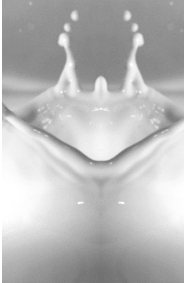Milk may be much less than made out
 Milk is good for growing bones – or so the old adage goes, but new research suggests this is probably not true.
Milk is good for growing bones – or so the old adage goes, but new research suggests this is probably not true.
In fact, the health benefits of milk could be one of the most common misconceptions going around.
It is odd that humans are among the only animals to actively consume - and apparently prefer - the milk of other species.
The high calcium content of cow’s milk has been touted as crucial for good bone health, especially when fortified with vitamin D, as some companies do.
But a new study from researchers at Uppsala University in Sweden says consuming large amounts of milk could be associated with higher mortality and bone fractures in women, and higher mortality in men.
“I've looked at fractures during the last 25 years. I've been puzzled by the question because there has again and again been a tendency of a higher risk of fracture with a higher intake of milk,” said the study's lead author Karl Michaelsson, a professor at Uppsala University.
The study has been compiled from data following two large, long-term Swedish studies of adult men and women; recording their dietary habits including how much and what types of milk and dairy products they consumed.
The new paper is published in the British Medical Journal.
The review found women who consumed three or more glasses of milk a day had a higher risk of fracture and a higher risk of death.
Men who drank three or more glasses of milk a day had a slightly higher risk of death - mostly cardiovascular death - compared to those who drank less than one glass a day.
There was no reduced risk of fracture as milk consumption increased.
Interestingly, the association between fractures or mortality and dairy consumption was not seen with derivatives of milk, such as cheese, yogurt, sour milk, and other fermented products.
In fact, each serving of cheese or fermented milk products was shown to reduce rates of mortality and hip fractures by 10-15 per cent.
The team said more research was needed to understand whether a specific component of milk - a sugar called D-galactose - might play a role in the findings.
In addition, the data showed increased levels of a biological marker of stress linked with higher milk consumption.
In both men and women, the amount of milk consumed was associated with higher levels of oxidative stress, which has been associated with aging, cancer and cardiovascular disease.
It is not the first study to observe the seemingly paradoxical relationship between the consumption of calcium-rich milk and bone fractures.
Meta-analyses in 2007 and 2011 found no association between the risk of certain bone fractures and milk consumption.
It now appears almost certain that excessive milk consumption is not beneficial to health. Recent research has linked dairy to ailments such as acne, as well as finding that about 65 per cent of the world cannot actually digest the lactose found in generous quantities in milk.
“Until very very recently, from an evolutionary perspective, humans would have consumed no milk products at all and would have consumed calcium from other sources,” said Dr David Ludwig, a Harvard professor of nutrition who was not involved in the most recent review.
“Populations that drink no milk at all have perfectly fine bones... which isn’t to say that milk is necessarily unhelpful, we just lack a good evidence base for the recommendation that we consume such high levels of it.”








 Print
Print